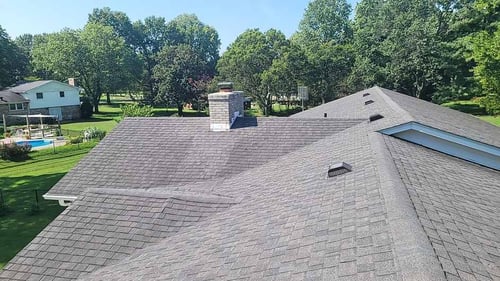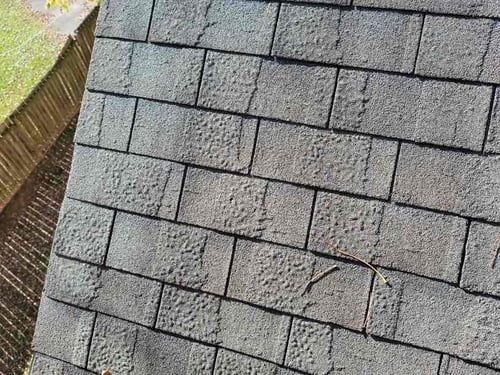You invested or are about to invest a lot of money into a new roof. Luckily, your roof is protected by roofing warranties against future problems.
Unfortunately, most homeowners don’t know what the warranties are or what they actually cover. This leaves them scrambling, trying to figure out what to do if a problem shows up or, even worse, paying to fix it without knowing it’s covered.
No one needs that stress on their mind or wallet.
For over 30 years, the team at Bill Ragan Roofing has helped homeowners understand their options when their roof has a problem. That’s why I want to break down what roofing warranties cover and for how long.
This article answers the following questions:
- What does a roofing contractor’s workmanship warranty cover?
- What does a standard roofing material warranty cover?
- How do you get an enhanced roofing material warranty?
What do roofing warranties cover?
A new roof comes with two types of general roofing warranties. You get one on the materials and another on your roofing contractor’s workmanship.
Both types of roofing warranties protect your roof investment, but they cover very different things. Let's look at what each roofing warranty covers and how long they last.
Roofing contractor’s workmanship warranty
A workmanship roofing warranty covers any future problems caused by installation errors. If your roof leaks or the roofing materials fail due to improper installation, then your contractor is on the hook to fix the problem.
 (Improperly installed roof)
(Improperly installed roof)
Every roofing contractor should provide a workmanship warranty, but the length varies from roofer to roofer. It could be anywhere from 2, 5, 10, or 25 years to even a lifetime warranty (life of the materials).
My recommendation is not to settle for anything less than a 10-year workmanship warranty. However, roofers who trust the quality of their workmanship should have no problem providing a lifetime warranty or close to it (20 years).
Some shingle manufacturers also allow homeowners to purchase a workmanship warranty through them. If it passes their inspection after installation, they’ll stand behind the workmanship for 25 years (depending on the manufacturer).
Standard roofing material warranty
A roofing material warranty is provided by manufacturers to cover defective materials and components. If the installed shingles or another component has a manufacturer defect, they’ll cover the cost of the new materials (labor and tear-off costs excluded).
 (Defective architectural asphalt shingles)
(Defective architectural asphalt shingles)
All shingles come with a standard warranty that’s pretty uniform across all the leading manufacturers. However, these standard warranties are considered “limited”.
For example, a standard roofing warranty on an architectural asphalt shingle is 30 years. However, it starts prorating after 10 years, which means the manufacturer pays out less as the years go by.
Any warranty you get from a manufacturer only covers their specific materials and/or components. So, if you get a mixed roof system, a standard shingle warranty from one manufacturer only covers the shingles, not another manufacturer’s underlayment.
Another thing to keep in mind is different types of roofing materials each come with a specific material warranty. For example, the material warranty on a steel standing seam metal roof is actually a paint warranty on the finish applied to the panels.
Then you have natural materials, like cedar shake or slate, that don't even come with a material warranty because they’re naturally occurring and don’t come from a manufacturer.
How do you get an enhanced roofing material warranty?
Now you know what the two types of roofing warranties cover and how long they’ll last. While a workmanship warranty is what it is, shingle manufacturers offer extended coverage with an enhanced material warranty if your roof qualifies.
To qualify for an enhanced warranty, all of your shingles and other roofing components must come from one specific manufacturer to form a complete roof system. After installation, you’ll register the roof with the manufacturer to get the 50-year non-prorated enhanced warranty.
This enhanced warranty ensures if just one of the manufacturer’s components fails, they’ll pay to replace your entire roof (both labor and materials). It can also be transferred to a new homeowner once, which is a great selling point when putting your home on the market.
Just know your roofing contractor must be certified with the specific shingle manufacturer to offer an enhanced warranty.
What voids your roofing warranties?
At the end of the day, roofing warranties are in place to protect your roof investment. That’s why it’s crucial to find the best protections available.
And don’t fall for the misconception or let a roofer tell you that companies don’t offer 20-year or lifetime workmanship warranties. Just because they don’t put that much value into their work doesn’t mean others don’t.
However, your roofing warranties mean nothing if they’re voided. Unfortunately, this happens too often simply because homeowners don’t know better.
This not only leaves your roof unprotected, but it also means more money out of your pocket. I don’t want this to happen to you or your roof investment.
That’s why I wrote another article breaking down what voids roofing warranties and how to avoid them.
Check out 5 Things That Void Your Roof Warranty to learn how to avoid leaving your roof unprotected.



